Xinhua Headlines: Xi's Russia Visit to Navigate Bilateral Ties, Boost Global Stability
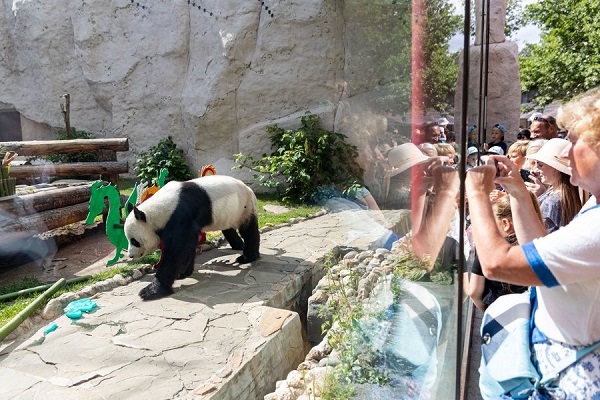 |
| Click the photo and watch the video. |
* Over the past decade, the two heads of state have met with each other on some 40 occasions. Their frequent and high-quality exchanges have always been guiding the development of China-Russia relations.
* China and Russia have blazed a trail in the growth of major-country relations featuring strategic trust and good neighborliness, setting a good example for a new type of international relations.
* The vision of building a community with a shared future for mankind not only reflects the common voice of all peoples and gathers the broad consensus of the international community, but also leads the trend of the times and the way forward for mankind.
BEIJING/MOSCOW, March 18 (Xinhua) — Chinese President Xi Jinping's upcoming state visit to Russia, his first foreign trip since being re-elected as Chinese president, will be a trip of friendship, cooperation and peace.
The visit, scheduled for March 20-22, is set to map out the blueprint for the development of the China-Russia comprehensive strategic partnership of coordination for a new era. It will also push ahead with the practical cooperation between the two countries, and inject strong impetus into the endeavor to maintain peace and prosperity so as to jointly build a community with a shared future for mankind.
Model for Major-Country Relationship
Earlier this month, footage of Chinese panda named Ruyi went viral online, which showed him playing and gorging himself on fresh bamboos in Moscow Zoo. Ruyi and his buddy Dingding officially moved to their new home in Moscow during a grand ceremony attended by Xi and his Russian counterpart, Vladimir Putin, in June 2019.
During that visit, the two leaders signed and issued a joint statement raising bilateral ties to the comprehensive strategic partnership of coordination for a new era, opening up a new chapter in China-Russia relations featuring higher level and greater development.
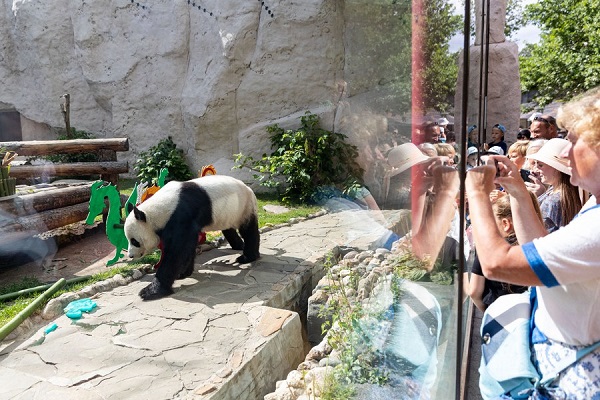 |
| Visitors look at giant panda Ruyi at the Moscow Zoo in Moscow, capital of Russia, July 31, 2022. [Xinhua/Bai Xueqi] |
Now Xi is about to set foot on Russian soil for the ninth time as Chinese president. Over the past decade, the two heads of state have met with each other on some 40 occasions. Their frequent and high-quality exchanges have always been guiding the development of China-Russia relations.
The past years have witnessed the steady growth of China-Russia ties with the inking of a host of important documents such as a joint statement on win-win cooperation and deepening their comprehensive strategic partnership of coordination in 2013, the China-Russia Joint Statement on a New Stage of Comprehensive Strategic Partnership in 2014, a 2015 joint statement on deepening comprehensive strategic partnership of coordination and advocating win-win cooperation, and the China-Russia Joint Statement on Further Deepening the China-Russia Comprehensive Strategic Partnership in 2017.
In 2021, the two presidents commemorated the 20th anniversary of the Treaty of Good-Neighborliness and Friendly Cooperation Between China and Russia and made the decision to extend the pact.
As the world is facing profound changes unseen in a century and the unprecedented pandemic, Xi and Putin have maintained close contact through various means, including a meeting during the Beijing 2022 Winter Olympics, traditional year-end online talks, calls and messages, and participating via video link in the ground-breaking ceremony of a bilateral nuclear energy cooperation project and other major events held in their respective countries.
Under the joint leadership of the two heads of state, the bilateral partnership has grown more mature and resilient.
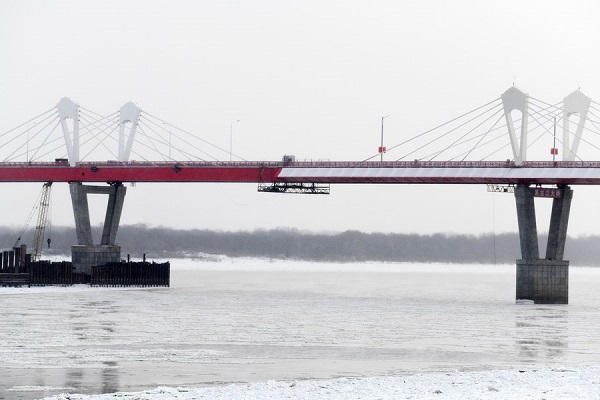 |
| This photo taken on Dec. 2, 2019 shows the joining part of the first highway bridge connecting China and Russia across the Heilongjiang River. The bridge across the Heilongjiang River stretches from Heihe, a border city in Heilongjiang Province, to the Russian city of Blagoveshchensk. [Xinhua/Wang Jianwei] |
As an ancient Chinese saying goes, "True partnership defies geographical distance." China and Russia have blazed a trail in the growth of major-country relations featuring strategic trust and good neighborliness, setting a good example for a new type of international relations.
Meanwhile, China-Russia ties are based on non-alignment, non-confrontation and non-targeting of any third party. The relations pose no threat to any other country in the world, nor are they subject to interference or provocation by any third party.
Russia and China have set an example for relationship between major countries, said Vasily Kashin, director of the Center for Comprehensive European and International Studies of Russia's National Research University-Higher School of Economics.
"Russia-China relations, which are efficient, responsible and future-oriented, have played a stabilizing role in international affairs," he said.
New Chapter in Cooperation, Friendship
In June last year, the Heihe-Blagoveshchensk cross-border highway bridge over Heilongjiang River opened to traffic. The new channel, a milestone in infrastructure connectivity, has connected China's northeast and Russia's far east amid booming economic and trade cooperation between the neighbors.
Two-way trade has been growing over the past decade, surging from less than 90 billion U.S. dollars in 2013 to more than 190 billion dollars last year and approaching the target of 200 billion dollars set by the two heads of state.
Exports of automobiles and spare parts from China to Russia have increased rapidly in recent years. By the end of last year, the number of automobile dealers of Chinese brands in Russia had climbed to 1,041.
Meanwhile, chocolates, honey, flour, and alcohol — quality Russian products as such have become more widely available for Chinese customers. The Russian Export Center, the country's state institution for export support, has announced an increase in the number of online shops in a bid to let Chinese customers have easier access to quality Russian products.
While the all-round bilateral practical cooperation is flourishing, people-to-people and cultural exchanges between the two countries are also thriving, which have built up popular support for China-Russia friendship.
Currently, the two peoples are marking the 2022-2023 years of sports exchanges after the youth friendly exchange year, media exchange year, subnational cooperation and exchange year, and scientific and technological innovation year.
Russia and China have carried out cooperation actively under the guidance of the two heads of state in the past 10 years, said Yuri Tavrovsky, a professor of the Russian University of Peoples' Friendship, who expects that the leaders of the two countries will open up more new areas for bilateral cooperation in the future.
For Equity and Justice
Back in 2013, Xi chose Russia as the destination of his first overseas trip after becoming president. In his speech at the Moscow State Institute of International Relations during that visit, Xi called for building a new type of international relations with win-win cooperation at the core, stressing the mankind "has increasingly emerged as a community of shared future in which everyone has in himself a little bit of others."
The vision of building a community with a shared future for mankind not only reflects the common voice of all peoples and gathers the broad consensus of the international community, but also leads the trend of the times and the way forward for mankind. Since it was proposed, the notion has been enshrined repeatedly in important documents of the United Nations, the Shanghai Cooperation Organization (SCO) and other multilateral mechanisms.
"Ten years have passed, and we understand that the notion's relevance has not decreased but is becoming more and more important," said Anatoly Torkunov, president of the Moscow State Institute of International Relations, who applauded Xi's speech at the scene in 2013.
The world has now come to another historical crossroads.
To revert to a Cold War mentality, provoke division and antagonism, and stoke confrontation between blocs, or to act out of the common good of humanity to promote equality, mutual respect and win-win cooperation — the tug of war between these two trends is testing the wisdom of statesmen in major countries as well as the reason of the entire humanity. Facts have repeatedly proven that containment and suppression is unpopular, and sanction and interference is doomed to fail.
At the critical moment in human history, Xi has made the important judgment that "the world today is undergoing profound changes unseen in a century," while Putin has also made similar assessment at the Valdai Discussion Club.
The more turbulent the world is, the more steadily China-Russia relations should forge ahead.
As the founding countries of the SCO, both sides have pushed forward multilateral cooperation, and extended the organization's focus from security to politics, economy as well as people-to-people and cultural exchanges. They have made joint contributions to a better world order, global and regional development, as well as the security of the SCO members.
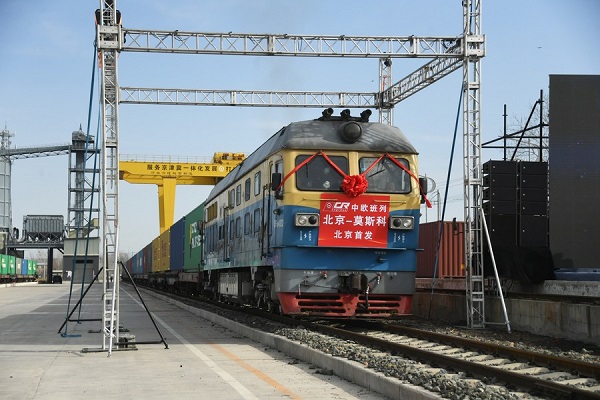 |
| A China-Europe freight train heading for Moscow departs from Mafang railway station in Pinggu District of Beijing, capital of China, March 16, 2023. [Xinhua/Ren Chao] |
Under the BRICS mechanism, Beijing and Moscow, together with other members, have played an active role in advancing the reforms of the global economic governance, and jointly created a stronger voice on major international and regional issues. Those efforts have enabled the emerging economies and developing nations to have more of a say on the world stage. And the developing economies, represented by the BRICS countries, have become the new engine of economic globalization in today's world afflicted by rising populism and protectionism.
China and Russia, as permanent members of the UN Security Council as well as important parties of the Group of 20, APEC and other key global and regional groups, have also worked closely on issues related to the situation in the Korean Peninsula, Afghanistan, as well as the Iran nuclear issue. They have played a leading role in promoting multipolarity and greater democracy in international relations and safeguarding global strategic balance and stability.
Ten years on, China will continue to work together with Russia to follow the trend of the times, drive global unity and cooperation and contain division and confrontation so as to make new and greater contribution to peace and development of humanity.
Video reporters: Sun Xiaoyu, Wang He, Liu Heyao; Video editors: Liang Wan shan, Mu Xuyao, Liu Ruoshi, Zhou Yang
(Source: Xinhua)
Please understand that womenofchina.cn,a non-profit, information-communication website, cannot reach every writer before using articles and images. For copyright issues, please contact us by emailing: website@womenofchina.cn. The articles published and opinions expressed on this website represent the opinions of writers and are not necessarily shared by womenofchina.cn.


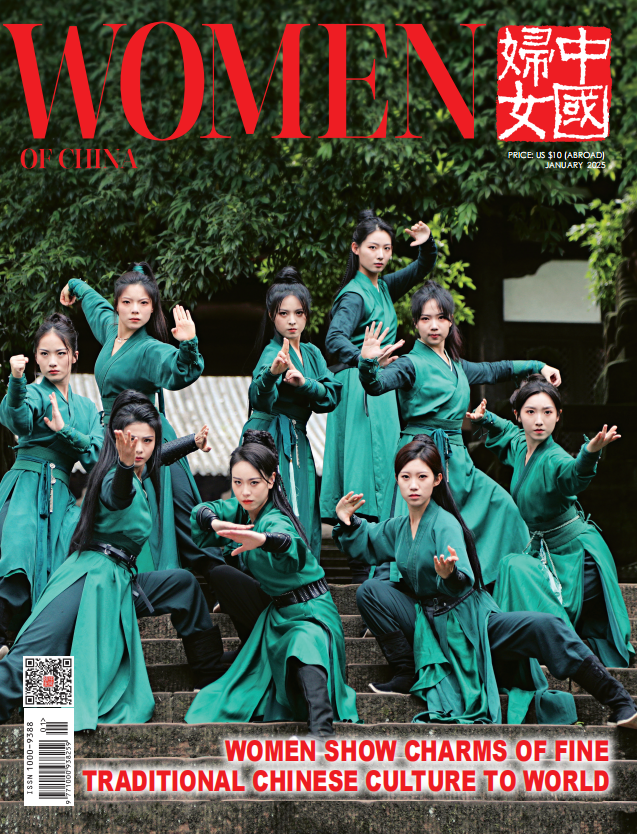



.jpg)

 WeChat
WeChat Weibo
Weibo 京公网安备 11010102004314号
京公网安备 11010102004314号